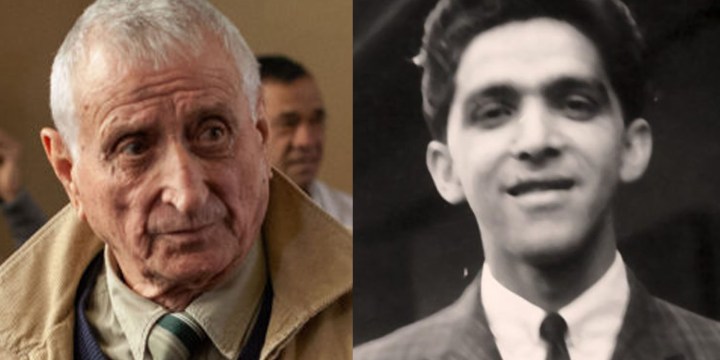MAVERICK CITIZEN
Speed up inquests into apartheid-era deaths, says Ahmed Timol’s family after Security Branch cop João Rodrigues dies

The NPA must get its house in order and stop deliberately dragging its feet, says the family of slain anti-apartheid activist Ahmed Timol.
The death of former apartheid-era Security Branch policeman João Rodrigues on 7 September slams shut another door in the ongoing effort to bring to book those implicated in the torture and deaths of anti-apartheid activists.
Rodrigues was 82 when he died at his Pretoria home. His lawyer, Ben Minnaar, says Rodrigues had been sickly for the past month and at one point had needed intensive care in hospital. Minnaar says: “He had been recuperating at home and we thought he was getting better, but things took a sudden turn for the worse.”
Rodrigues, who was a police clerk in the Security Branch, was implicated in the 1971 murder of Ahmed Timol following the reopening of the inquest in 2017 into the activist’s death.
In the original inquest in 1972, Timol’s death was ruled a suicide. The state claimed that the 29-year-old anti-apartheid activist and teacher died after jumping from the 10th floor of what was then the John Vorster Square police station in central Johannesburg during a police interrogation.
The reopened inquest overturned the 1972 ruling and found that Timol was tortured and murdered by Security Branch officers.
Rodrigues was turned in by his estranged daughter, Tilana Stander, forcing him to appear at the reopened inquest. Rodrigues had admitted to raping Stander when she was a child. The 2017 inquest ultimately ruled that Rodrigues had to stand trial for his part in Timol’s murder.
Since then, Rodrigues had been using legal delaying tactics, including seeking a permanent stay of prosecution, to dodge his day in court. He had appeared in 19 remand hearings, preventing his criminal trial from proceeding. In July, Rodrigues’ lawyers applied to the Constitutional Court for leave to appeal against a Supreme Court judgment that had a month earlier denied his bid for a permanent stay of prosecution.
As a former member of the police, Rodrigues’ legal bills were covered by taxpayers. Only through a Promotion of Access to Information Act application made in May 2019 by Imtiaz Cajee, Timol’s nephew, did the Department of Justice and Correctional Services reveal that the legal costs in Rodrigues’ case at that point had soared to more than R3.5-million.
For Cajee, who pushed tirelessly since 2003 to have the inquest into his uncle’s death reopened, the Constitutional Court ruling might hold the key to possibly setting a precedent that will stop other implicated apartheid-era policemen from using endless legal ploys to stall justice.
“Rodrigues’ death before he could be tried was not unexpected because the tactic has always been to delay, and in essence he did get away with murder,” Cajee says.
He adds, though, that the expected Constitutional Court ruling will be “very significant” in the reopened inquests of other anti-apartheid activists, including the cases of Neil Aggett, Ernest Dipale and Hoosen Haffejee that are currently being heard and finalised in the lower courts. There are about another 300 similar cases that were referred to be investigated and reopened by the Truth and Reconciliation Commission back in 2003. Only a handful has come before the courts.
“The apex court must rule on this matter so that other perpetrators cannot apply the same strategy of delaying,” Cajee says.
He also slammed the government agencies that he says have continued to fail families of slain activists, even now, in a democratic era.
“It is time that the National Prosecuting Authority (NPA) be confronted directly on the conduct and behaviour of their members sitting in the priority crimes unit, specifically advocates Chris Macadam and JP (Torie) Pretorius. In 2019 the full bench of the South Gauteng High court was very clear that these two advocates should be investigated by the National Director of Public Prosecutions. But today they remain in those offices — positions they’ve held since 2003.
“Under the leadership of the Minister of Justice, the Deputy Minister of Justice and the NPA, they’ve been allowed to derail this entire process of post-TRC prosecutions; always deflecting, always apportioning blame, everybody else except themselves,” Cajee says.
Rodrigues going to his grave without disclosing details of the final days and moments of Timol’s time in detention has left Cajee and the Timol family with questions that may never be fully answered. Cajee says this should be a moment for the NPA to get its house in order.
“Speaking on behalf of many, many other families, we are sick and tired of the public utterances, which are simply lies with absolutely no level of commitment of honesty and of integrity.”
Cajee adds that there need to be efforts to fast-track the reopening of inquests and to bring these matters to conclusions speedily, without former detainees having to relive their traumas by testifying over and over about their torture and abuse at the hands of Security Branch police.
The Foundation for Human Rights (FHR), responding to Rodrigues’ death, says he “spurned the invitation to come before the TRC in 1997”. The foundation has been supporting the reopening of the TRC cases and says that had Rodrigues cooperated at the time, “the lead interrogators in the Timol case of Captains Johannes Hendrik Gloy and Johannes Zacharias van Niekerk and the investigating officer, Major-General Christoffel Andries Buys, who were all alive in 2003 when Cajee asked the NPA to investigate, could have been held accountable”.
The FHR statement added: “The families of victims feel betrayed and abandoned by South Africa’s post-apartheid state, which deliberately suppressed the investigation and prosecution of apartheid-era crimes. The families of the Cradock Four, Nokuthula Simelane, Imam Haron, Matthew Mabelane, Caiphus Nyoka, Coline Williams, Bayempini Mzizi, to name but a few, continue their fight for justice against all the odds.” DM





















 Become an Insider
Become an Insider
Comments - Please login in order to comment.